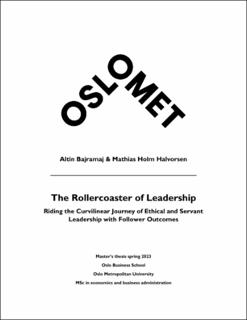| dc.description.abstract | The 21st century saw a considerable emphasis on moral forms of leadership and how this impacts the organization and its followers. This thesis will focus on the ethical and servant form, where previous research mostly has examined the linear consequences on follower outcomes. Drawing on social exchange and social learning theory, positive relations between outcomes and the ethical and servant leadership approach were hypothesized. However, an expanding collection of empirical data in the management literature suggests that antecedent variables that normally provide desirable outcomes, cease to do so when taken too far. Thus, inspired by the too-much-of-a-good-thing effect, we aim to extend the research by examining the non-linear relationships between these leadership styles and the follower outcomes organizational citizenship behavior, job satisfaction and performance.
The study is quantitative, using 131 leader-subordinate dyads. Followers’ organizational citizenship behavior and performance was rated by the leaders while subordinates rated their own satisfaction with work and their perception of the leader’s ethical and servant leadership behavior. We found both ethical and servant leadership to significantly predict job satisfaction. We did not find ethical leadership, nor servant leadership to predict OCB or job performance in a linear manner. This challenges the existing empirical framework as these relationships may not be as straightforward as initially expected and suggests that the effect of these leadership approaches may be mediated or moderated by other variables. Also, the findings did not support that too much ethical leadership predict follower outcomes as curvilinear.
However, we found high levels of servant leadership to positively predict organizational citizenship behavior and performance. Despite the fact that we expected a negative curvilinear effect, these findings still suggest that a non-linear relationship may exist in the dynamics between servant leadership and follower outcomes. | en_US |
